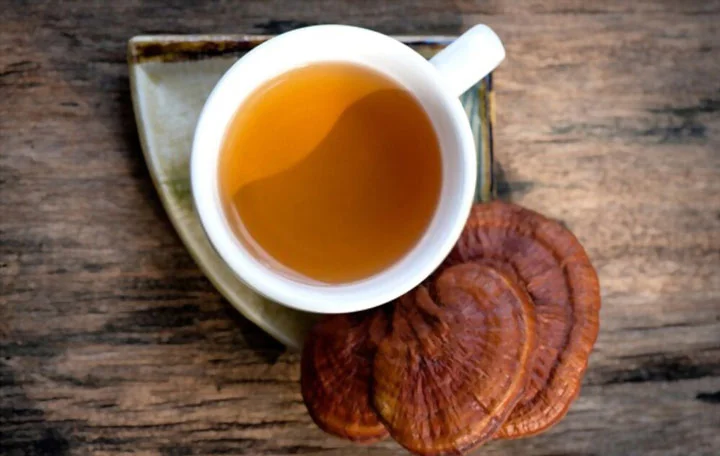The Asian Use of Turkey Tail Mushrooms in Medicine: A Comprehensive Exploration

Turkey tail mushrooms, scientifically known as Trametes versicolor, have been utilized in traditional Asian medicine for centuries. These mushrooms, with their vibrant colors and unique appearance resembling the tail feathers of a turkey, have gained recognition for their potential health benefits. This blog post aims to delve into the Asian use of turkey tail mushrooms in medicine, exploring their historical significance, active compounds, and potential therapeutic applications, while providing relevant citations to support the information presented.
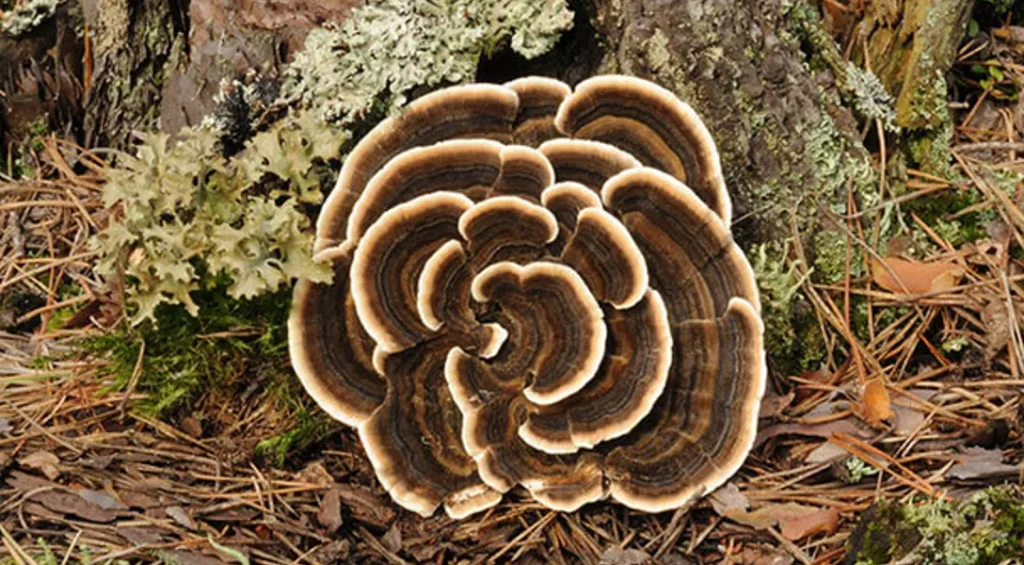
Historical Significance:
Turkey tail mushrooms have a long history of use in Asian traditional medicine, particularly in China and Japan. In Chinese medicine, they are known as Yun Zhi, while in Japan, they are called Kawaratake. These mushrooms have been documented in ancient texts, such as the “Compendium of Materia Medica” by Li Shizhen, a renowned Chinese herbalist from the Ming Dynasty. Their use in traditional medicine is rooted in their purported ability to support overall health and well-being.
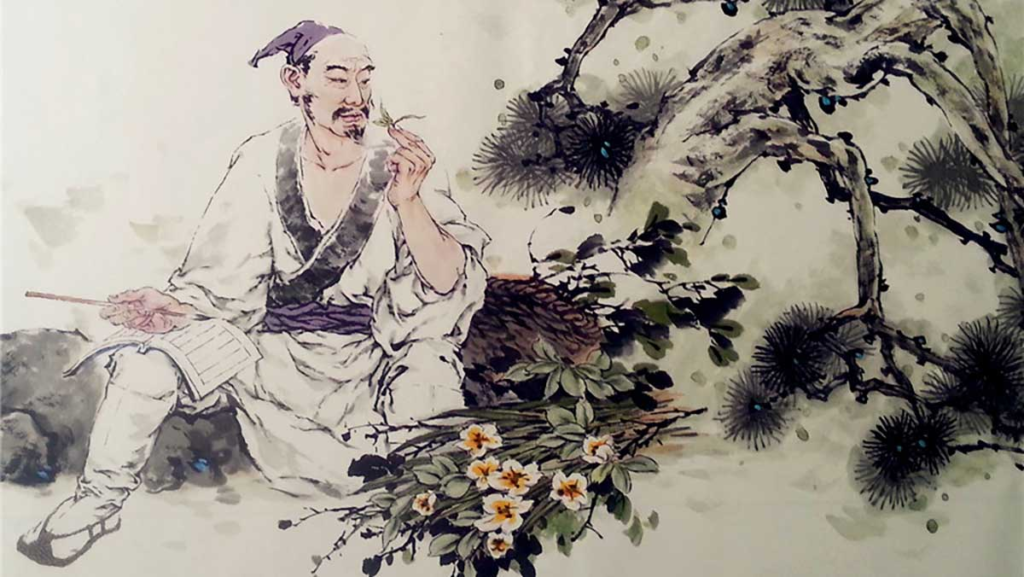

Active Compounds:
Turkey tail mushrooms contain a diverse array of bioactive compounds that contribute to their medicinal properties. One of the key components is polysaccharopeptides (PSPs), which have been extensively studied for their immunomodulatory effects. PSPs have shown potential in enhancing immune function, stimulating the production of natural killer cells, and promoting the body’s defense against pathogens.
Another important compound found in turkey tail mushrooms is beta-glucans. These complex carbohydrates have been recognized for their immunostimulatory properties, aiding in the activation of immune cells and promoting a balanced immune response. Beta-glucans have also been associated with potential anti-inflammatory and antioxidant effects, further contributing to the mushrooms’ therapeutic potential.

Therapeutic Applications:
1. Immune Support:
The immunomodulatory properties of turkey tail mushrooms have been extensively studied. Research suggests that the bioactive compounds present in these mushrooms can enhance immune function, making them a potential adjunctive therapy for individuals with compromised immune systems. A study conducted in Japan demonstrated that PSPs extracted from turkey tail mushrooms exhibited anti-tumor effects by stimulating immune responses in cancer patients.
2. Cancer Treatment Support:
Turkey tail mushrooms have gained attention for their potential role in cancer treatment support. Studies have shown that the bioactive compounds in these mushrooms, particularly PSPs, may help enhance the efficacy of conventional cancer treatments, such as chemotherapy and radiation therapy. Research conducted in China revealed that PSPs could improve the immune response and quality of life in breast cancer patients undergoing chemotherapy.
3. Gut Health:
The gut microbiota plays a crucial role in maintaining overall health, and turkey tail mushrooms have been associated with potential benefits for gut health. Research suggests that the bioactive compounds in these mushrooms may have prebiotic properties, promoting the growth of beneficial gut bacteria. A study conducted in Korea found that turkey tail mushroom extract increased the abundance of beneficial bacteria, such as Bifidobacterium and Lactobacillus, in the gut.
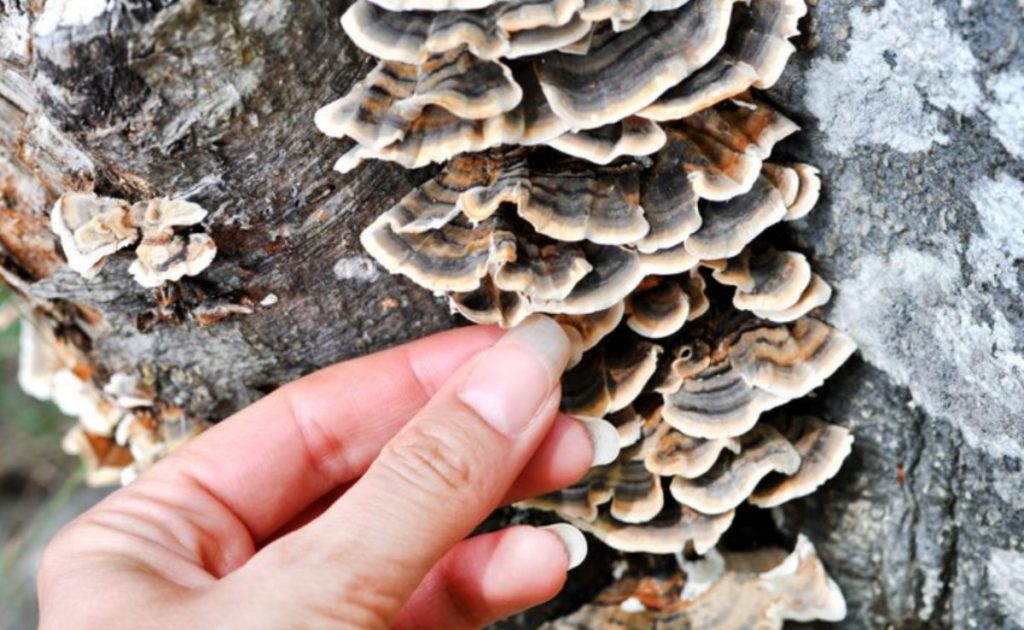
4. Antioxidant and Anti-inflammatory Effects:
The presence of beta-glucans and other bioactive compounds in turkey tail mushrooms has been linked to antioxidant and anti-inflammatory effects. These properties may help protect against oxidative stress and chronic inflammation, which are underlying factors in various chronic diseases. A study conducted in Taiwan demonstrated that turkey tail mushroom extract exhibited potent antioxidant and anti-inflammatory activities, potentially contributing to its therapeutic benefits.
5. Liver Protection:
The liver plays a vital role in detoxification and overall health. Turkey tail mushroom has been investigated for its potential hepatoprotective effects. Research suggests that its bioactive compounds, including triterpenoids, can help protect liver cells from damage caused by toxins and oxidative stress. By supporting liver health, turkey tail mushroom may contribute to overall well-being and assist in maintaining optimal liver function.
Conclusion:
The Asian use of turkey tail mushrooms in medicine has a rich historical background and is supported by scientific research. The active compounds found in these mushrooms, such as PSPs and beta-glucans, have shown potential in supporting immune function, aiding in cancer treatment support, promoting gut health, and exerting antioxidant and anti-inflammatory effects. However, it is important to note that while turkey tail mushrooms hold promise, further research is needed to fully understand their mechanisms of action and establish their efficacy in various therapeutic applications.
Tahoe Botanicals Turkey Tail Tincture is double-extracted to provide both water soluble and alcohol soluble elements for maximum benefits. We use organic grain alcohol to extract certain compounds and terpenes, and then purified water to extract other compounds, like polysaccharides and beta-glucans. We use only the highest quality, organic or sustainably wild- harvested Turkey Tail fruiting bodies in our tinctures, which are always made in small batches by hand, with care and precision by dedicated herbalists.
- DISCLAIMERS: * Consult with your doctor or physician before use if you are breastfeeding, pregnant or are on any prescription medication. *This product is not intended to diagnose, cure or treat any diseases. *These statements have not been evaluated by the FDA.
-
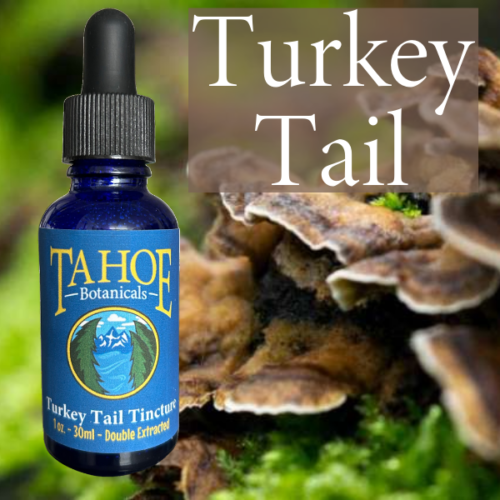 Turkey Tail Tincture 1 oz$15.00
Turkey Tail Tincture 1 oz$15.00
References:
- Ren Z, et al. Polysaccharide-protein complex of turkey tail fungus Trametes versicolor induces apoptosis in human nonsmall cell lung cancer cells. PLoS One. 2013;8(8):e71363.
- Chen W, et al. Extracts of Tram

